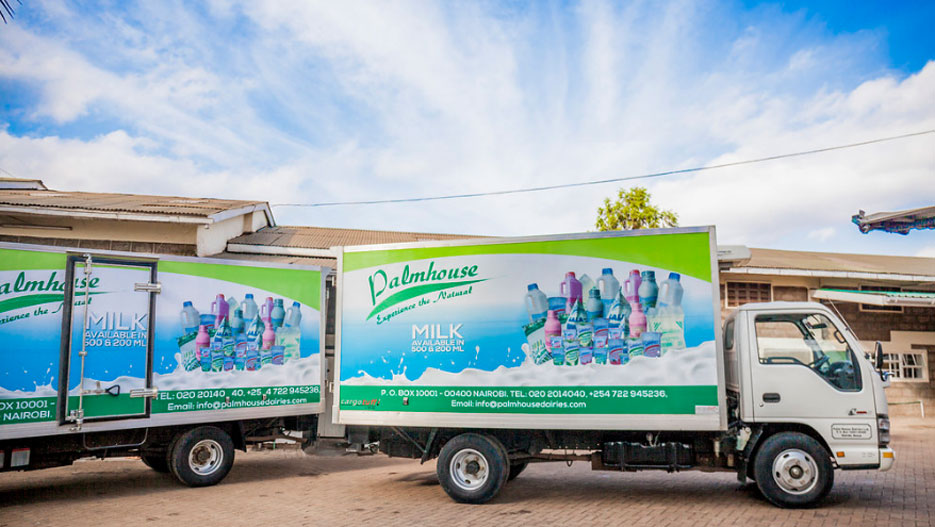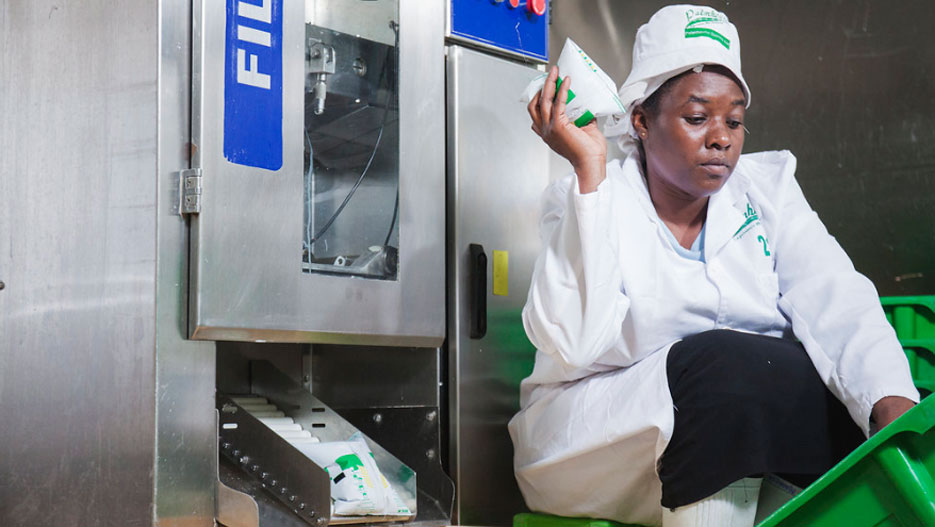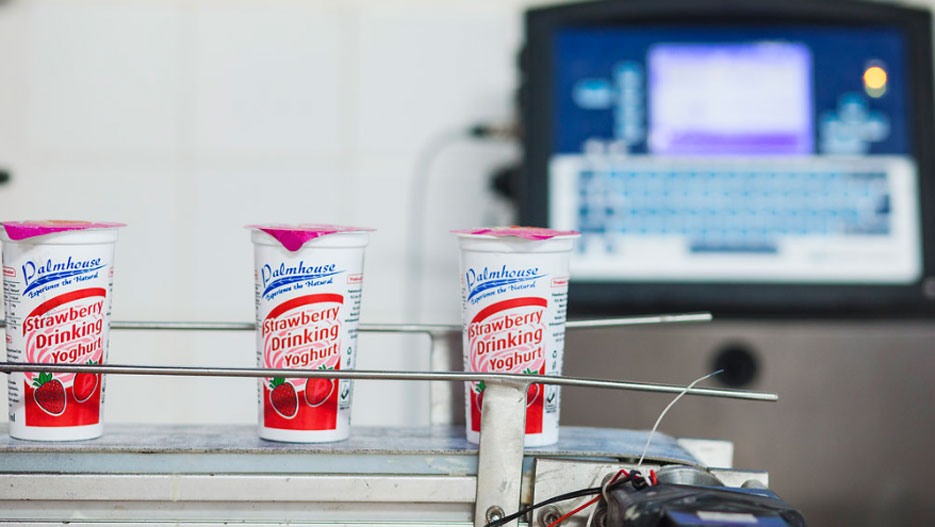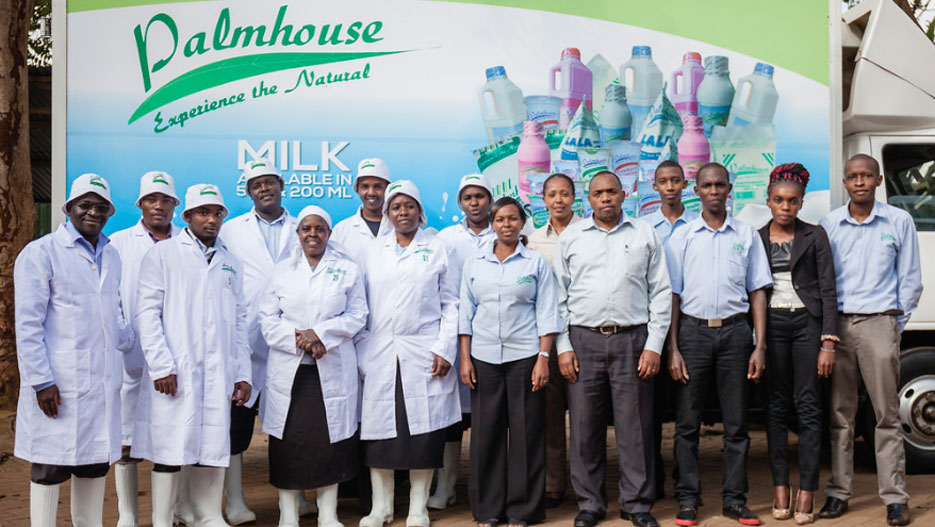Palmhouse Dairies: Overview of the Dairy Industry in Kenya
Eric Kimani and Margaret Munene give an overview of the dairy sector in Kenya and share their vision for Palmhouse Dairies as well as the Palmhouse Foundation.
Interview with Eric Kimani and Margaret Munene, General Managers of Palmhouse Dairies
What is your assessment of the dairy sector in Kenya?
Eric Kimani: I think the sector in Kenya is very vibrant but still highly unexploited. Kenya, outside of South Africa perhaps, remains the largest dairy producer in Africa. However our processing level is still way behind. I think we have not yet met 40% processed milk levels, which means 60% of the milk is still unprocessed. This means there is huge opportunity. We have seen the entry of the French Danone company and yet there are still huge opportunities for anyone who wants to invest in the industry. In my view, there has been too much government protection of inefficient monopolies in the name of KCC [Kenya Co-Operative Creameries] which for the longest time was the sole producer of milk until we and Brookside and others came along. Again, the infrastructure in Kenya was underdeveloped. Now it is opening up and milk can reach the processing units. A lot of milk was produced and wasted in the farms because there were no roads or infrastructure. That is changing and as it changes, more milk is now available. Also, the industrialisation and the economic growth have helped a lot. Ten or twenty years ago, Kenyans earned perhaps half of what they earn today. Therefore today they have a higher purchasing power and so more people can drink processed milk. As those things change the industry will grow. People now have the purchasing power. The middle class in Kenya doubled over the last ten years and if it doubles again, just think what will happen to the milk market!
There are huge opportunities to develop and grow. I suppose the idea is to grow as fast as possible because otherwise the other players, international or local, will take up the space. Can you explain your strategy?
Eric Kimani: A couple of people have asked us the question “If the opportunity is here, why are you not growing? Why don’t you want to take that opportunity?” We do want to take that opportunity but in my view we do not have the managerial capacity at this time and we do not have the financial capacity. You need the managerial capacity to be able to deal with the increased financial capacity. We need to look for good sources of finance and also good management to manage the growth. My wife and I have many other interests and I guess we are satisfied with what we have, we earn enough for our daily needs, but we could grow three, four or even ten times over if we had people to challenge us and come and take up that challenge with us.

What kind of investor are you looking for? Are you looking for an investor that not only brings in finance but also some technical knowledge?
We supply our customers directly which is perhaps the attraction that has meant some of our customers have been with us for twenty years because we give them a first class service and a first class product.
Eric Kimani: I don’t know if we need people who are already working in this industry because we know the basics of this industry. We would like to see people who want to come and who are prepared to take up the challenge from a technical point of view, a marketing point of view and a managerial point of view. There are many companies where you find that the CEO is there in everything, or there is an entrepreneur there who wants to drive it all; well we don’t want to drive it, we want somebody to come and drive it that we can work with. I know it sounds unusual! It is not what happens normally in the market, many people want to grow, grow, grow and take it all on but we have other interests which although they are not money related, are very important in our lives. Here we have a profitable venture, an opportunity which we can see and we would be able to direct any partner who would like to come on board with us and help them with our local knowledge. We are one of the longest surviving dairy companies in this country. We have been here for 20 years and I think only Brookside and KCC can boast that. We know something about this industry that can be very useful but we are tied by the management matter because my wife and I are unable to take it to the next level.
Let´s talk about the company, what are your strengths? Tell us about your products.
Eric Kimani: Basically our dairy is largely white milk. We do about 5000 litres of milk a day, split between the white milk and the by-products. After milk our next biggest product would be cream. We sell a lot of cream, we purchase cream and we sell cream from our own milk. We purchase cream from some of the other dairy manufacturers. We also do yoghurts and other value added products such as buttermilk. Our capacity is about 5000 litres and we supply directly, we do not wholesale. We supply our customers directly which is perhaps the attraction that has meant some of our customers have been with us for twenty years because we give them a first class service and a first class product.
What is your customer base?
Margaret Munene: We have a niche market in the institutions. All of the milk we produce we sell to institutions. The majority of them are five star hotels and the very high end hospitals in Kenya like Nairobi Hospital. We also supply a few schools. The bulk of our product is milk, I would say 90% of what we produce is milk but we also do yoghurt and buttermilk and we sell a lot of cream. Yoghurt is a relatively new product in Kenya because when we started the dairy twenty years ago, a lot of Kenyans didn’t know what yoghurt was, they only knew what buttermilk was. Now, there is a big middle class in Kenya and a lot of people now drink yoghurt. There is a huge market in yoghurt production and recently we have acquired a very good machine to make yoghurt because we want to enter that market in a bigger way than we have been doing. The yoghurt we make we will sell to the institutions but now we will also retail it.

Tell us more about the products, why are they so appreciated by the five star hotels?
Margaret Munene: Palmhouse is known for its quality and service. Nairobi Hospital for example, which is the high end hospital in Nairobi, has been our customer almost since inception of our company. Our customers stay with us and it is because of the quality and service. Usually we deliver very early in the morning but let´s say a hotel runs out, they can just call us and we can send milk to them directly, they don’t have to run to the supermarket. We have very good customer service, our customers tell us that.
How do you transport the milk?
Margaret Munene: We have three trucks. We only deal with about 5000 litres a day so we have three trucks that leave very early in the morning and do all of our supplies. We don’t deal with middle men and that is another added advantage because it means we can give very good prices to our customers.
So I think the kind of investor you need is someone very specialised in natural products, environmentally friendly products, and niche products… someone that is at a high end level.
Margaret Munene: Yes, and someone who can come up with some other products that perhaps we are not doing yet and most importantly which aren’t yet in Kenya which we could introduce. Something like Greek yoghurt for example is not very common in Kenya but we don’t have the capacity to do it at the moment so if we had an investor to help us come up with new products that are not common in Kenya and to help us introduce them and advertise them, that would be great. Another problem that we have actually is advertising; it is one of the reasons that we haven’t grown very big for example by selling in supermarkets, because to sell in supermarkets you need to do a lot of advertising to compete. We don’t want to spend that kind of money in advertising because of our size. It is a chicken and egg kind of thing.
Also, you are high end, so you aren’t competing on the same level as the supermarket products.
Margaret Munene: Yes.
You are a niche product, so you are talking about quality.
Margaret Munene: Yes. There are many high end hotels that have come up in Kenya in the last two or three years so there is a huge market for our kind of product, even in just white milk. I am sure a lot of those high end hotels would want to be supplied by a company like Palmhouse Dairies.
You mainly supply Nairobi I believe?
Margaret Munene: Yes.
So you have the possibility of pushing that to other places, perhaps where the tourists are. What is your development strategy?
Eric Kimani: I think the strategy for Palmhouse that would bring a lot of returns and would make a lot of good money, would be to further go into the niche market. I know of a company called Bio Foods, who came and took up the niche and are now the leading yoghurt producer and value added producer, in fact most airlines use their yoghurt. My idea would be to see our yoghurt in almost every airline in Kenya, as well as almost every hotel that is looking for quality service and quality product. Even if we got just half or a quarter of that business that would be good. We are looking for people who can help us and like you said we are not looking for a Managing Director of Danone to come and grow this business, this is not what we are looking for. We are looking for someone who wants to work with a high end product, a concentrated high value product and we would want to change that 90% white milk to 10% value added production ratio to 60% value added and 40% white milk. That would make us ten times the money without even adding volume.

Can you tell us about the Palmhouse Foundation?
Eric Kimani: The Palmhouse Foundation is something that my wife and I set up thirteen years ago. Being investors in this rural area, a lot of people came to us with requests for support for high school fees for their children. We began by helping one or two but then we decided to structure it and select three students and help them for the four years. Our argument was that because we had invested money here and made money from this farm, we might as well help some people. In our second year of operations I was CEO of some large companies in Nairobi and so then we thought “why can´t we do this on a national scale?” We know so many people and have many friends so we wanted to do it on a country wide scale. We called up a few friends and we formed a board of trustees of ten people and in our third year we went national. For the last ten years we have been going around the whole country selecting needy, deserving, bright students and we pay for their school fees for the four years in a quality high school anywhere in Kenya. We raise money all over the country and most of the medium banks in Kenya work with us, even KCB used to work with us but now they do it on their own. The biggest newspaper Nation Media used to work with us but five years ago they said they wanted to do it on their own and they now do it on a greater scale than we do. We are very well respected as a foundation; I think we are the first and most respected local foundation. We are very small, the most students we have taken on is 85 in one year but those 85 were taken through high school and beyond. We stay with our students; now we have helped just over 600 students through high school and many are now finished and doing phenomenally well, some in America, Russia, and all over the world. In fact some of them have started to sponsor other students within the foundation. It is something we are very proud of and we spend a lot of time on. We are the founding trustees but now it is owned by many more Kenyans. There is a board of trustees, and a board of advisors made up of very high level CEOs in Nairobi and it has done extremely well. It is one of our greatest achievements. We spend a lot of time on it pro bono. It is a calling for us.
Margaret Munene: I would really like to emphasise that Palmhouse Foundation is a totally indigenous foundation, started by Kenyans for Kenyans. We don’t have any outside help. We don’t even like to call Palmhouse Foundation an NGO because a lot of NGOs get funds from outside and we don’t get any funds at all from outside Kenya. All of the trustees that work and help with the foundation all work pro bono. When I go to Kitale to look for students, I am not paid, I pay for my air ticket, and I pay for my accommodation. We are twelve trustees and that is what we all do. The board of advisers that help us are all totally pro bono. We started the foundation in 2003 and a lot of other foundations have since come up and they have all copied our model, we are very happy that they have done so. A lot of them come and ask us to give them handouts that we use for mentoring. Some ask us to help them to recruit students. We are very proud of it and we feel that we have really changed the education field in Kenya. A lot of poor students who are bright Kenyans are now able to go to school. It was not the case years ago.
These students could go on to invest in your company for example and grow the business.
Margaret Munene: We have some students who are already working. We have one that went to study in America and she is now finished and is working and sponsoring a child through us. She got into the University of Duke in America and she intends to come back to Kenya when she finishes.
What do you think of the education sector in Kenya?
Margaret Munene: I think a lot has improved in the education sector in Kenya in the last ten years. We now have free primary education which was never the case before, so now even very poor children are able to access primary education. People used to have to pay for primary education. Secondary education is still a challenge for the poor. I think five years ago the government started giving bursaries to schools. They have put money into schools so that students don’t have to pay as much; I think about ten thousand shillings a year. For university education in Kenya, if you do well students can get loans which they start paying once they start working. So if you are a bright student today it is possible to go through school and university. That is my view.
Eric Kimani: I agree. Primary school is free. Secondary school is more expensive than university and that is where the challenge lies. You can get higher education loans for university if you do well and there are many private universities now. If you look at the statistics for the whole of Africa, the education in Kenya is one of the best. If you walk through the village here for example almost everyone can speak to you in English because they are able to have some basic education. There have been questions about whether the quality has deteriorated with all of the universities that have come up and all of the other teaching institutions but I think that is being addressed. I think in the whole of sub-Saharan Africa you will find that Kenya ranks amongst the top three if not the top five.

That is why Kenya is doing so well in the ICT sector, mobile banking, etc. To conclude, what is your vision for the next few years?
Eric Kimani: In the next five years I would want to have reached the goal we have set of raising a million dollars for an endowment from which we can draw in the future to achieve the goals of the Palmhouse Foundation. We have now raised about 20 million shillings but I pray that in the next five years we can bring that up to 1 million dollars. So if you know of a big philanthropist who wants to give money… you can save me the trouble of waiting five years!!
In terms of the dairy, if I do not get the investor we were talking about, or anyone else who can give us a push, we will still go for a strategy of moving this dairy from white milk to a value added product dairy. That will improve my bottom line without needing a lot of other investments. I have seen this begin to happen last year and it is happening this year. We are expanding the value added side and shrinking the milk side of our business. I would want to see myself in five years doing 50% value added products and 50% white milk. That would make a lot of money. Once we had a technical adviser from the Netherlands, a retired Dutchman, who came and spent a couple of days with us. He agreed with us, he was the one who solidified our thoughts that this is the way to go. If we can go for this niche of value added products it will be very profitable, therefore my medium and long term vision is to reach that dream, whether we do it with investors or we continue doing it on our own. If we do it on our own we will do less and it will take longer, if we do it with other people we will make more money and we will do it faster. As to whether and when that will happen, that is perhaps why people like you are here to interest people in this discussion.
Margaret Munene: I absolutely agree. We would want to have the Palmhouse Foundation reach one million dollars because every year we go around looking for people to donate money to take the children to school. If we get an endowment we would use the proceeds to take the children to school and we wouldn’t have to keep on looking for that money. The other thing that I would want to see in the next five or ten years would be many of our beneficiaries coming back into the foundation to move it forward as mentors and trustees of the foundation. They could give feedback and give the students advice. Then we wouldn’t have to be so actively involved because that is very important in terms of the legacy of the foundation, because if we aren’t here we would not want the foundation to die. It is very key to us.
In terms of Palmhouse Dairies, we are really working on value addition and with or without a partner that is the way we want to go. We will continually increase value addition and reduce white milk. As my husband said, if we get somebody to come in and work with us, that is good but if we don’t, slowly we will still go in that direction.